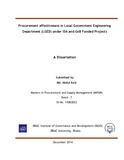| dc.description.abstract | In 1999, WB and ADB conducted joint review of the country portfolio procurement performance
and prepared an action plan for government on public procurement. The World Bank in
agreement with the Government of Bangladesh (GoB) has prepared the Country Procurement
Assessment Report (CPAR) in 2002 and identified several deficiencies in the procurement
system of the GoB. As per recommendations of the CPAR, the GoB established a procurement
policy unit within the Implementation, Monitoring and Evaluation Division (IMED) under planning
ministry. GoB then issued “The Public Procurement Regulations 2003” in September 2003 for
streamlining the process and to ensure unified procurement systems for government’s
departments as well as autonomous, semi-autonomous bodies and corporations. In July’ 2006
GoB then enacted “The Public Procurement Act, 2006” (PPA 2006) and consequently in January’
2008 issued “The Public Procurement Rules, 2008” (PPR 2008) to ensure transparency and
accountability in the procurement of goods, works and services using public funds. On the other
hand, the world bank guidelines are used for the procurement under IDA financed project.
The objectives of the research was to study the effectiveness of the procurement course of
actions in LGED under IDA and GoB funded projects as well as to find out the factors affecting
procurement management systems and to suggest for further enhancement of the procurement
process. The methodology of this research was a combination of literature review,
questionnaire survey, key informants interview and secondary data collection from project
offices. The major literatures that reviewed are world bank procurement guidelines, PPA 2006,
PPR 2008, website documents, different procurement journals and reports. The questionnaire
survey data were collected from 30 different levels LGED officials as well as from 8 contractors
and 2 consultants.
The major findings in this research are; Tender Notices floated as per Rule 61 (4) of PPR 2008
keeping sufficient time for the preparation and submission of tenders from the date of
advertisement on the basis of official estimated costs. 93% and 87% of TER approved within
specified timeframe for GoB funded IRIDP project and IDA financed RTIP II project respectively.
The main reasons for time extension is due to fund flow crisis, shortage of labour, price hike of
construction materials and natural calamities delay works. The main causes for contract
variation are scope of work change, faulty estimate preparation and design variation. Barriers
for proper contract implementation are; lack of commitment both PEs and contractors, lack of
knowledge on procurement processing for the PE’s staffs, massive tender documents, lack of
Procurement Effectiveness in LGED Page vi
training and development, political influences, lack of knowledge of the contractors and their
staffs, attitudal problems, fund flow crisis and so on related issues. 100% respondents
commented that introduction of e-procurement system increased efficiency and decreased
malpractices in the procurement process. It is observed that IDA financed RTIP II project is
better performing than GoB funded IRIDP project because of better fund flow, extensive
monitoring & supervision systems, application of donor’s compliances and so on related issues.
Major suggestions provided by the researcher for effective implementation of the procurement
process are; Publication of user friendly simplified tender documents, Strict applications of the
procurement rules and regulations, Estimate should be prepared more cautiously to avoid
variation order preparation, Time extension should be discouraged by applying liquidated
damages, Ensuring training and development both for PE’s staffs as well as for contractor’s
concern personnel for adapting them in effective procurement practices, Ensuring governance
and internal control for making it more effective, Introducing reward system for better
performance and punishment for poor performance for effective implementation of the
contracts, Ensuring extensive use of e-procurement systems to increase efficiency,
transparency and quick processing. | en_US |

